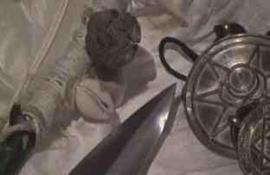

Magick, spelt with a "k" to differentiate it from conjurors tricks and illusions, is a term which was coined by Aleister Crowley in the early years of the twentieth century. In the past it has received many different definitions but it is probably safest to say that there are as many definitions of Magick as there are people that practice it.
This is really not a particularly satisfactory answer for the earnest seeker!
Crowley defined Magick as "The Science and Art of causing Change to occur in conformity with Will". He extrapolated this statement further in the first chapter of his opus magnum "Magick in Theory and Practice".
Essentially, this definition includes every willed action as being Magick.
Magick was referred to by Crowley as "The Yoga of the West" and his techniques in Magick being "The Method of Science, The Aim of Religion.". Crowley was very concerned that every aspect of Magickal work should be recorded and that thereby greater understanding of the effects of different techniques could be made. He also felt that the results obtained by the combination of visualisation (and other techniques of altering states of consciousness) with religious and philosophical ideas in medieval ceremonial magic bore a remarkable resemlance to the association of Yoga (and its often purported supernatural effects) with the religions of the East.
One of Crowley's contemporaries in the occult field, Dion Fortune, extended Crowley's definition further as being "The art of causing changes in consciousness in conformity with will". This brings in the further problem of defining consciousness, and is of little use in making the definition any clearer: It is impossible to tell whether a change is one in "consciousness" or it is a "real" change since all we have to experience "reality" with is "consciousness".
So far all these definitions have been somewhat vague. This is because Magick encompasses such a wide range of activities that being more specific would exclude potential or already explored acts of Will which are or will be Magickal. The problem of defining "Magick" is similar in nature to that of defining "Art". Magick as it is commonly thought of includes all acts which are done with intent to achieve a result while the act and expected result have no obvious way of being linked; for example someone pressing a plastic button on a wall and a light coming on (if there is no knowledge of the existence of electricity and the electric light). Once there is a scientific explaination for an occurrence, it ceases to be called "Magick" and starts to be called "Science".

Magickal tools.
Specific magickal acts include such things as banishing, invocation, divination, evocation, astral travel, pathworking, talismanic magick (including sigilization), sympathetic magick, dreaming, waking up in the morning, experiencing consciousness, making breakfast etc.
Magick is usually done with a specific intent. Intent can be anything
imagined but it usually falls into one of the following groups:
1)
Information gathering.
2) Changing the self.
3) Changing the
environment.

Bottles of herbs and
incenses.
Magick is usually structured in such a way as to be intelligible to the person performing the act. It often uses a framework of some sort (a philosophy or a "flavour" for the Magick). This may be Buddhist or Hindu Philosophy, traditional magical systems such as the Qabalah, the religions of the ancient world (Egyptian, Sumerian), modern Magickal systems such as Thelema, Wicca and Chaos or any system that the magickian wishes to utilize or invent. The framework is used as a structure from which particular archetypes or currents are drawn in accordance with the intended result of the ritual. Often the modern systems are combined either with each other or with the longer established philosophies.